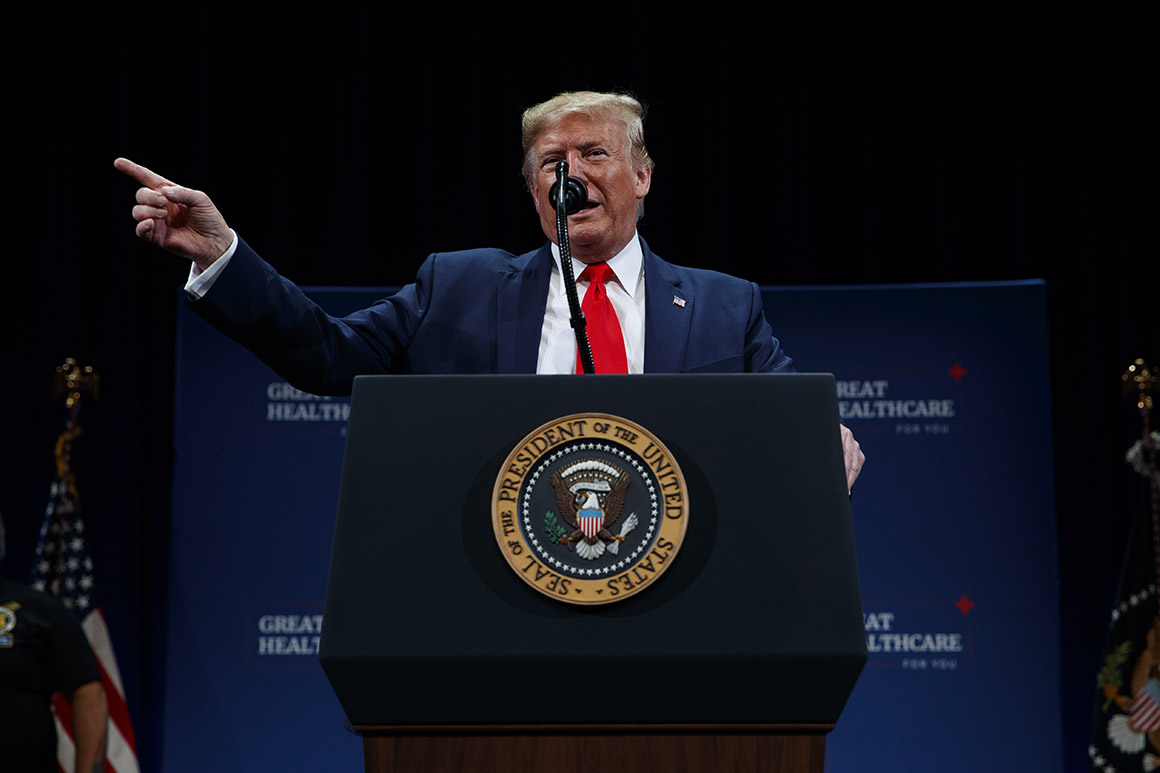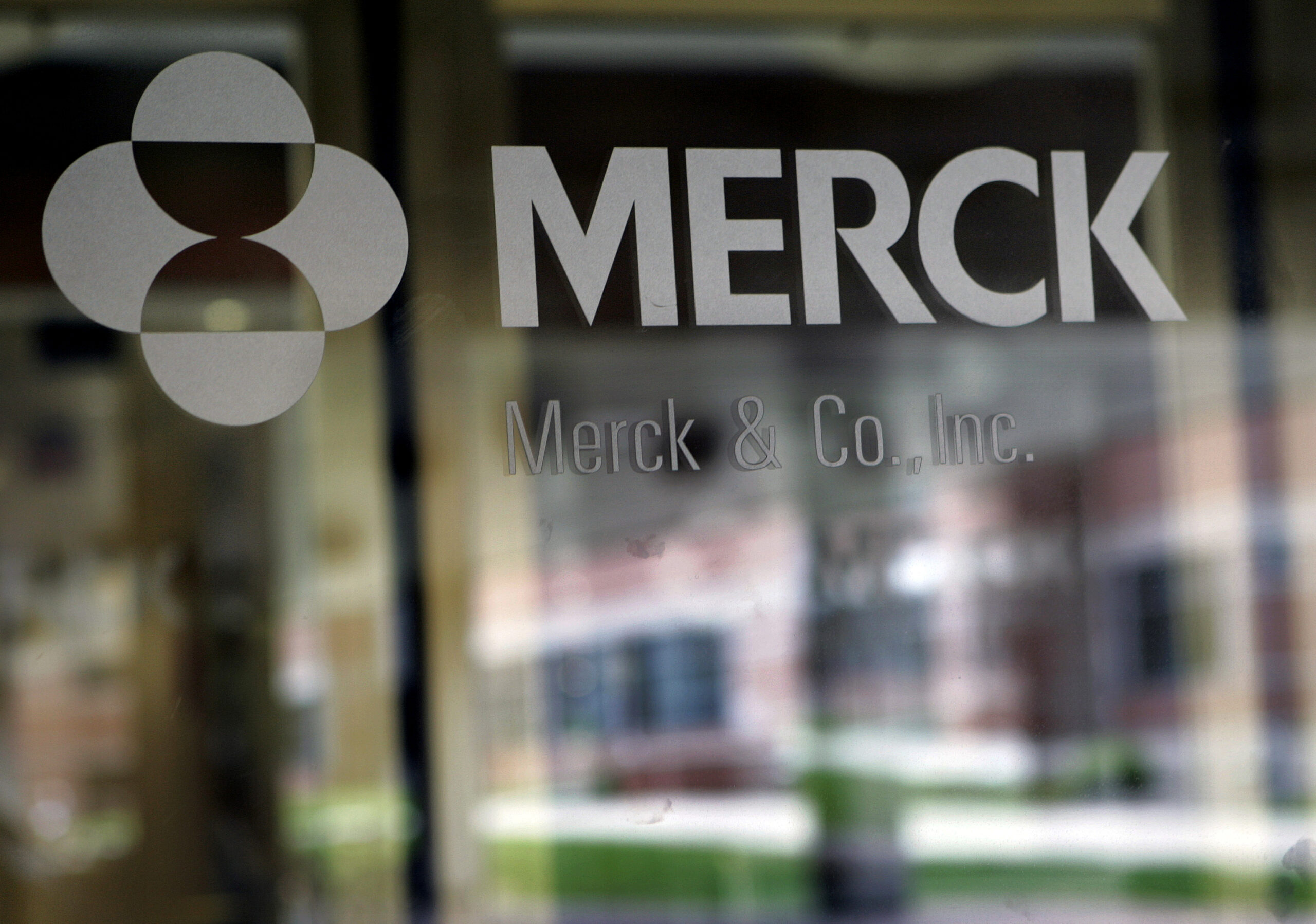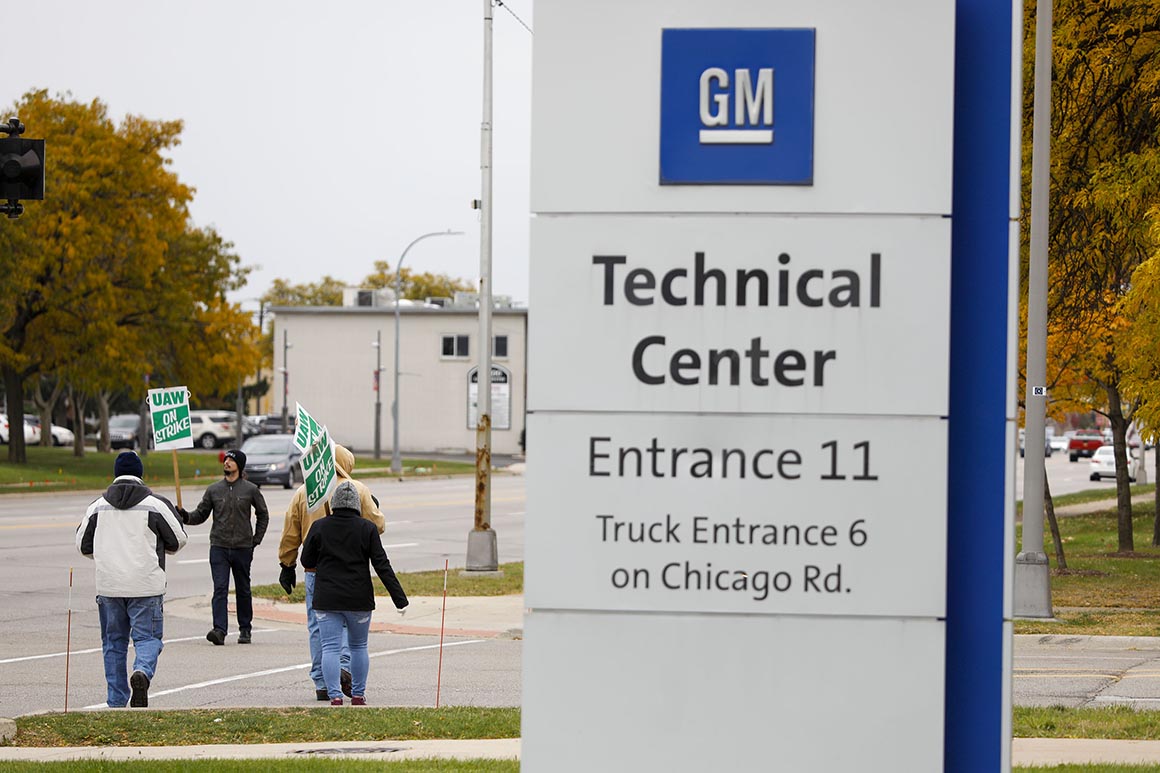Healthcare
Trump promotes private Medicare coverage, drawing contrast with Democrats’ health care plans

[ad_1]
The speech is a part of the White House’s efforts to put Trump’s health care agenda at the forefront of his reelection campaign, hoping to attract swing voters uncomfortable with his attacks on the Affordable Care Act or a fully government-run health care system championed by two of his chief 2020 Democratic rivals, Sens. Bernie Sanders and Elizabeth Warren. Trump has recently rolled out a series of health care initiatives, including an overhaul of kidney care and proposed new price transparency measures, and plans to issue more in the coming months.
Thursday’s speech, which was originally planned for August but was canceled in the aftermath of two mass shootings, gave Trump a chance to try to change the subject from the rapidly moving impeachment inquiry. But he frequently went off-script to recall old grievances and new — decrying the Russia investigation, lamenting the rise of Warren in the polls and accusing the Democrats of pursuing impeachment to hurt his reelection chances.
“That’s why they do the impeachment crap, because they know they can’t beat us fairly,” said Trump, who also suggested without evidence that drugmakers played a secret role in fueling the impeachment effort because they’re unhappy with his efforts to lower drug prices.
Trump gave his speech at The Villages retirement community outside Orlando, alongside allies in the key swing state. They included Florida’s first-year Republican Gov. Ron DeSantis, whose plan to import cheaper prescription medicines from Canada and other countries has been supported by Trump, eager to show progress on reducing drug prices.
Trump’s strategist argue his health care efforts are meant to reclaim the party’s advantage on the issue, a top concern for swing voters — and one that Democrats owned in the 2018 midterms. Democrats are accusing Republicans of trying to “sabotage” the Affordable Care Act and its insurance protections for preexisting conditions, a theme they will return to in the 2020 elections.
Trump’s advisers have been downplaying the failed effort to repeal Obamacare and they’ve insisted the president is doing big things on health care. Still, Trump showed he’s not ready to let go of that fight. He briefly criticized the late Sen. John McCain’s “thumbs down” vote that derailed the repeal effort — though he didn’t mention his former rival by name this time — and teased yet again the possibility of taking another run at the 2010 health care law after the election.
“If the Republicans take back the House, keep the Senate, keep the presidency — we’re gonna have a fantastic plan,” Trump said.
Trump in the wide-ranging speech praised his administration’s efforts on health care, including efforts to curb opioid overdoses and the new plan to end HIV transmission within a decade. He also touted efforts to take on drugmakers and teased his plans to allow “safe and legal importation” of prescription drugs.
Some of the efforts he mentioned, though, have had a limited impact. A law expanding access to experimental medications to terminally ill patients has only helped a few people. And a rule requiring drugmakers to disclose list prices in television advertisements has been blocked by a federal judge, though the administration has appealed the ruling.
Federal health officials said Thursday’s executive order is aimed at beefing up Medicare and its rapidly growing offshoot run by private plans, Medicare Advantage. The order calls for bolstering telehealth services – which would reduce the need for visits at the doctor’s office for a frail population – and supplemental benefits Medicare Advantage plans can offer.
Enrollment in Medicare Advantage plans has swelled to more than 20 million, or more than a third of all Medicare beneficiaries, and is expected to keep rising. The Trump administration, with support from Congress in some case, has already expanded the scope of supplemental benefits insurers can offer, such as in-home services, transportation to the grocery store and park passes. Critics have accused the Trump administration of favoring Medicare Advantage over the traditional program, despite concerns that the government overpays insurers and seniors could face limited provider networks.
Trump’s order directed his government to expand Medicare Advantage beneficiaries’ access to tax-advantaged medical savings accounts. It also calls for his health department to propose ways for Medicare Advantage enrollees to receive cash rewards or rebates as a perk for saving the government money when they receive quality care.
The executive order also includes lower-profile initiatives the administration has already pursued, such as reducing the administrative burden on health care providers. The order calls for minimizing the time between FDA approval of a drug and Medicare’s determination of whether to cover the treatment.
[ad_2]
Source link

Healthcare
Merck sues HHS over drug negotiation, claims program ‘tantamount to extortion’

[ad_1]
The New Jersey-based company is asking the U.S. District Court for the District of Columbia for an injunction to stop the rules from going into effect over the next several months.
“Because this statute unlawfully impairs our core purpose of engaging in innovative research that saves and improves lives, Merck intends to litigate this matter all the way to the U.S. Supreme Court if necessary,” Robert Josephson, a Merck spokesperson, said in a statement.
The White House, HHS and CMS did not immediately respond to a request for comment on the lawsuit.
At issue are the requirements surrounding the Inflation Reduction Act’s negotiation process, in which CMS will negotiate what Medicare pays for 10 widely used, high-priced drugs with no generic competition.
Merck, in its complaint, said the negotiations and the stipulated minimum discounts drugmakers are forced to provide lest they incur a massive tax, run afoul of the Fifth Amendment’s takings clause, which requires the government provide “just compensation” for property taken for public use.
“The IRA wields the threat of crippling penalties to force manufacturers to transfer their patented pharmaceutical products to Medicare beneficiaries, for public use. And the [Inflation Reduction] Act costumes these seizures as ‘sales’ by forcing manufacturers to accept Government-dictated payments that represent a fraction of the drugs’ fair value. By definition — and by design — that is not ‘just compensation,’” the company claimed in its suit.
Merck also argued that, by participating in what it calls “sham negotiations and agreements,” its freedom of speech is being stifled.
“Conscripting companies to legitimize government extortion is the sort of parroted orthodoxy that the First Amendment’s compelled-speech doctrine forbids,” the suit said.
Further, the company told the court that the government is stopping Merck from engaging in “counterspeech” about the negotiations following guidance CMS issued in March that prohibits companies from publicly disclosing “any information exchanged verbally during the negotiation period.”
“The IRA uses severe penalties to requisition medicines while refusing to pay their fair value — and then coerces manufacturers to smile, play along, and pretend it is all part of a ‘fair’ and voluntary exchange,” the suit alleges.
The timing is important: CMS is slated to release a list of the first 10 drugs for negotiation on Sept. 1 — less than three months away. Merck’s widely prescribed blood sugar medicine Januvia is likely to be among the medicines chosen. The company said it expects its cancer drug Keytruda and Janumet, a diabetes treatment, will be selected in future rounds.
[ad_2]
Source link
Healthcare
Auto industry could shift to make ventilators

The U.S. faces a shortage of life-saving ventilators if patients infected with Covid-19, a respiratory disease caused by the coronavirus, overwhelm U.S. hospitals.
President Donald Trump on Wednesday invoked the Defense Production Act, which will allow him to direct domestic manufacturers to produce medical supplies and other necessary items during the crisis.
White House economic adviser Larry Kudlow said Wednesday that he was in touch with leaders of two of the three major U.S. automakers. Ford and Fiat Chrysler also said they would suspend production of automobiles until at least March 30.
“One of them told me that even though the men and women may be off for two weeks due to the virus, she’s going to try to call them back so they can produce ventilators,” Kudlow said on Fox News, in an apparent reference to Barra, the only female CEO of a major U.S. auto company.
“They might even ask them to do it on a voluntary basis for civic and patriotic reasons,” he said.
The auto industry in Canada has also expressed a willingness to produce necessary medical supplies for demand in that country.
“We’ve got the capacity to make things from simple one-shot molds to complex assemblies. We make 500,000 of something every year, a thousand a day,” said Flavio Volpe, president of Canada’s Automotive Parts Manufacturers’ Association.
“The country needs masks, gowns, goggles, ventilators. Can we assign some of our capacity to be able to help the cause,” he said in an interview with CBC. “The response has been overwhelming from auto parts makers. We’re in, just get us the specs.”
Healthcare
Hospitals bid for $100 billion in next coronavirus package

As prominent employers in many congressional districts, hospitals are used to being heard, and lawmakers are signaling that they’re ready to step in. Senate Minority Leader Chuck Schumer, who is closely aligned with New York’s hospital lobbies, vowed he’d fight for a “Marshall Plan for hospitals”
Schumer’s calling for $400 billion to purchase equipment and deal with the expected swell in patients. The money would also address cash-flow issues for facilities that will take a major financial hit postponing lucrative elective procedures like joint replacements.
The hospitals’ lobbying push rapidly intensified this week as government officials presented sobering forecasts of staggering caseloads and reports out of virus-ravaged Italy showed overwhelmed hospitals rationing care — a harbinger of what could happen to the more unwieldy, patchwork U.S. system.
Millions of Americans remain uninsured and some of the most impoverished states don’t have coverage for some low-income residents because they haven’t expanded Medicaid. But even in states that did, projections show the health system could be overwhelmed in a matter of weeks. Colorado, Kentucky, Massachusetts and Ohio have suspended elective surgeries to try and keep beds open.
The cancellation of these procedures began, for some, even before Surgeon General Jerome Adams urged them to do so over the weekend. Many patients simply heeded public officials’ advice to stay home.
Now, many hospitals are in limbo, waiting for a potential surge of Covid-19 patients. What this means for their financial situation varies. Small, rural hospitals, in particular, were already close to going broke before the virus hit, but they’re also used to operating on small margins. After years of consolidation, some big health systems in urban areas have built up huge overhead as their hospitals and specialty centers see a massive drop-off in referrals and appointments for pricey procedures.
Meanwhile, hospitals in some hard-hit areas are grappling with more infected patients, coupled with a lack of personalized equipment to keep frontline nurses, doctors and other staff safe.
“We’ve had a dramatic shift in our area in the last three to four days,” Cassie Sauer, president and CEO of the Washington State Hospital Association, said earlier this week. “The number of patients has grown exponentially.”
Those hospitals that haven’t seen cases yet are ramping up for the pandemic.
The waiting game raises questions about how long some hospitals can they keep paying their staff while turning away paying business at an ever-accelerating pace.
Jose Sanchez, CEO of the Chicago safety net Norwegian American Hospital, said he’s got enough cash to make the next two payrolls. For now, he’s trying to make sure all expected billings come in on time — especially from private Medicaid plans where he’s seen a delay as insurers have their staff working from home.
“If you were in a different business, you’d be laying people off, but that’s just the opposite of the situation we’re in,” said Charlie Shields, CEO of Truman Medical Centers in Kansas City, Mo., who’s canceled elective surgeries and seen a sharp drop in admissions. He hasn’t run out of cash yet and said they can run a while — but he wants a federal funding boost in the meantime.
And with the supply shortage of protective gear intensifying, Shields said he’s seizing any chance to stock up on inventory, further driving up costs.
Scott Christensen, CEO of Delta Regional Medical Center in Mississippi’s impoverished Delta region, said he expects the coronavirus to arrive at his doorstep any minute. Cases have been confirmed in neighboring counties and he’s setting up a drive-through testing site — mostly for free, since Mississippi didn’t expand Medicaid and imposes some of the strictest limits on who gets covered through the program.
Christensen shuttered the hospital’s cardiac rehabilitation center and sleep center, and patients generally have stopped showing up. But he hasn’t furloughed any workers — yet.
“It’s been a really bad month financially,” he said. “But we’ll have to get through it.”
Still, the situation isn’t equally dire for all, and some hospitals are used to empty beds. A study from Congress’ Medicare advisers found that most rural hospitals only have about 40 percent of their acute care beds occupied on a given day. Since coronavirus hospitalizations so far skew elderly, some may see a financial boost — especially if Congress goes through with the Medicare sequester freeze.
Wall Street is sparking some of the financial concern. A J.P. Morgan analysis first reported by Bloomberg painted a grim picture for two major for-profit hospital chains — Community Health Systems and Tenet Healthcare Corp. — that also hold major debt and need to keep up their planned revenue from scheduled procedures.
Chip Kahn, CEO of Federation of American Hospitals, which represents for-profit systems, said essentially the pandemic could upend some hospitals’ entire business models, by replacing expensive inpatient procedures with intensive coronavirus treatment. He warned, some big-name chains “could really be in trouble.”
The average surgical hospital stay brings in nearly $44,000, compared to under $20,000 for a non-surgical stay. And the demographics will change, as coronavirus brings in more Medicaid and uninsured patients.
He noted that for the seriously ill, hospitalizations rack up costs quickly, and as coronavirus spreads the cases may not all be covered with commercial insurance.
That said, analysis from J.P. Morgan this week found 87 percent of responding hospitals said they hadn’t yet racked up extra staffing or supply costs due to coronavirus. The respondents said they also had not yet seen “measurable” deferments of scheduled procedures due to coronavirus fears, although that could be changing rapidly.
Fitch, a ratings agency, said not-for-profit hospitals and health systems should have “sufficient financial cushion to absorb an increase in operating costs” but warned, that some smaller facilities are at heightened risk, and the coming economic disruption will increase pressure on all providers.
-

 Politics6 months ago
Politics6 months agoFEMA Staff Accused of Withholding Aid from Trump Supporters After Hurricane – Calls for Hate Crime Charges and Jail Time Emerge
-

 Entertainment6 months ago
Entertainment6 months agoGeorge Clooney’s Final Stand: Hollywood Icon QUITS Politics for Good After Kamala Harris’ Slip and Trump Triumph
-

 Politics2 years ago
Politics2 years agoTucker and President Trump explore Bedminster and talk about “America’s favorite sport” and what happens if you misbehave at Bedminster
-

 Politics6 months ago
Politics6 months agoPolish President Andrzej Duda Reportedly Visits Mar-a-Lago to Meet with Donald Trump
-

 Politics2 years ago
Politics2 years agoEXPOSED: JOE BIDEN TRAGEDY ADULT VIDEO PUBLISHED BY TUCKER!
-

 Politics6 months ago
Politics6 months agoTrump’s Bold Move: Dan Bongino for Secret Service Director? The Inside Scoop on Security and Threats!
-

 Politics6 months ago
Politics6 months agoFormer Disney and Pixar Designer Sentenced to 25 Years for Child Exploitation and Human Trafficking
-

 Politics6 months ago
Politics6 months agoTrump’s Bold Move: Appoints Hardline Border Czar to Launch Mass Deportations – “Kamala, You’re FIRED!
-

 Politics6 months ago
Politics6 months agoMSNBC in Flames! Pelosi Blames Biden for Kamala Endorsement—A Turning Point for the Democratic Party?





